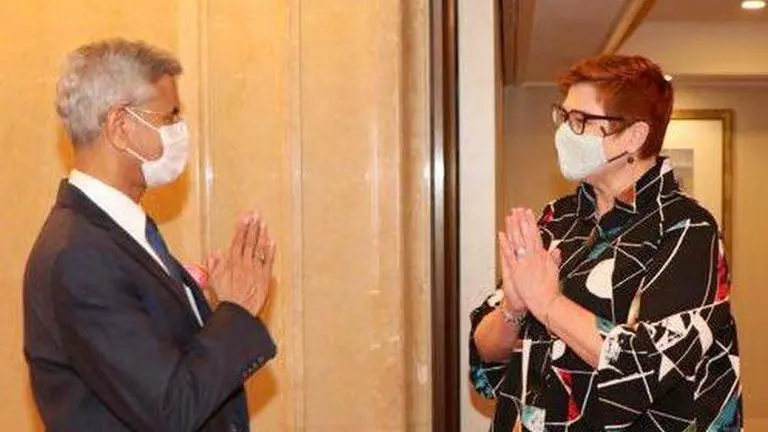Updated 7 October 2020 at 13:40 IST
Quad group to deepen cooperation to promote inclusive and open Indo-Pacific: Aus FM
Australian Foreign Minister Marise Payne has said that the Quad group, including India, Japan and the US, would deepen cooperation among the member countries to work together to promote an inclusive and open Indo-Pacific as well as support COVID-19 recovery
- World News
- 4 min read

Australian Foreign Minister Marise Payne has said that the Quad group, including India, Japan and the US, would deepen cooperation among the member countries to work together to promote an inclusive and open Indo-Pacific as well as support COVID-19 recovery.
In an official statement issued on Tuesday after attending the 2nd QUAD ministerial meeting in Tokyo, Payne said the group agreed to work better together on protecting critical technology and minerals, to uphold maritime security in the region, co-operate on countering cyber attacks, terrorism and disinformation.
Payne, External Affairs Minister S Jaishankar and US Secretary of State Mike Pompeo took part in the first in-person meeting of the foreign ministers of the 'Quad' hosted by Japanese Foreign Minister Toshimitsu Motegi.
It took place in the backdrop of China's aggressive military behaviour in the Indo-Pacific, South China Sea and along the Line of Actual Control (LAC) in eastern Ladakh.
Advertisement
"We reaffirmed our commitment to working together, and with regional countries, to support COVID-19 recovery and promote a stable, resilient and inclusive Indo-Pacific," Payne said.
Payne said the group reiterated the commitment to supporting Indo-Pacific countries in managing the health and economic impacts of COVID-19, and also agreed that access to safe and effective COVID-19 vaccines would be a critical factor not only to save lives but also to drive regional economic recovery.
Advertisement
She noted that the strategic environment in the Indo-Pacific was becoming more complex and that the pressure on the rules, norms and institutions that underpinned stability had the potential to undermine recovery.
"We emphasised that, especially during a pandemic, it was vital that states work to ease tensions and avoid exacerbating long-standing disputes, work to counter disinformation, and refrain from malicious cyberspace activity. Ministers reiterated that states cannot assert maritime claims that are inconsistent with international law, particularly the United Nations Convention on the Law of the Sea (UNCLOS)" she said.
China is engaged in hotly contested territorial disputes in the South and East China Seas. Beijing has also made substantial progress in militarising its man-made islands in the past few years.
Beijing claims sovereignty over all of the South China Sea. But Vietnam, Malaysia, the Philippines, Brunei and Taiwan have counterclaims. In the East China Sea, China has territorial disputes with Japan.
The South China Sea and the East China Sea are stated to be rich in minerals, oil and other natural resources. They are also vital to global trade.
"We agreed to enhance cooperation to promote a strategic balance in the Indo-Pacific, and work to support a region of resilient and sovereign states that engage each other on the basis of rules, norms and international law'' Payne said, adding that ministers underscored their strong support for ASEAN centrality, and the important role of ASEAN and ASEAN-led architecture, particularly the East Asia Summit, in supporting regional stability and recovery.
The ministers agreed on the importance of the principles set out in the ASEAN Outlook on the Indo-Pacific in guiding the region out of the COVID-19 crisis and shaping the post-pandemic regional order, she said.
Quad countries will continue to deepen cooperation in areas including maritime security, cyber affairs and critical technology, critical minerals, counter-terrorism, and humanitarian assistance and disaster relief, the Australian foreign minister said.
Ministers agreed on the importance of strengthening the resilience of regional supply chains, key cyber-enabled systems and critical infrastructure.
"To this end, we emphasised the importance of quality infrastructure investment as a driver of strong, sustainable, balanced and inclusive economic growth, which will be critical to supporting the region's economic recovery," she said.
Payne said the ministers also agreed to strengthen cooperation with other countries "including in the Mekong sub-region" - in a sign that the four nations are looking to deepen their alliance with China's neighbour Vietnam.
Image credits: Twitter / @DrSJaishankar
This story has not been edited by www.republicworld.com and is auto-generated from a syndicated feed
Published By : Press Trust Of India
Published On: 7 October 2020 at 13:40 IST
